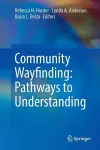
Community Wayfinding: Pathways to Understanding
3 contributors - Paperback
£129.99
Rebecca H. Hunter, MEd has over 25 years of experience in research, teaching and community service roles at the University of North Carolina at Chapel Hill. Currently affiliated with the Center for Health Promotion and Disease Prevention, her expertise falls largely into the categories of mobility, aging and the built environment. Most recently, she led a series of initiatives pertaining to community wayfinding to articulate the relationship between public health and wayfinding and to develop a blueprint for research, practice and policy. She has also actively engaged in research translation and dissemination, collaborating with practitioners, policy makers and researchers in diverse fields such as planning, transportation, architecture, universal design, aging services, engineering, healthcare and public health.
Lynda A. Anderson, PhD, has worked in the field of aging and public health for over 30 years. She retired from federal service in 2015 having worked at Centers for Disease Control and Prevention for 23 years, 10 years as the Director for Healthy Aging. She has more than 150 publications and is a co-author on the book, "Public Health for an Aging Society" (2012). Lynda has a long-time passion for gardening and designing gardens using native plants. She is currently engaged in volunteer efforts to help promote cognitive and physical health through community gardening and environmental activities including wayfinding.
Basia Belza, PhD, RN, FAAN, is the Aljoya Endowed Professor in Aging, School of Nursing and Adjunct Professor, School of Public Health, and an investigator with the Health Promotion Research Center at University of Washington, Seattle. She has a sustained record of scholarship related to the dissemination of evidence- and community-based health promotion programs and development and implementation of a research and translation agenda on the public health aspects of healthy aging. Her particular interests lie at the intersection of increasing older adults’ physical activity and improving access to and safety of the built environments in which they are active.